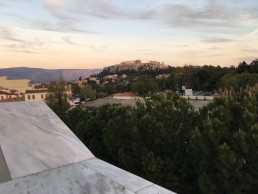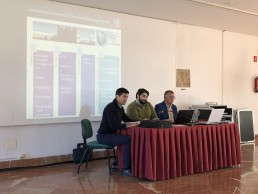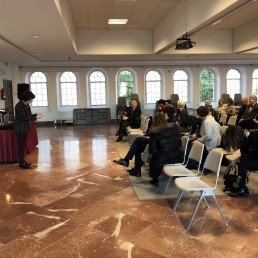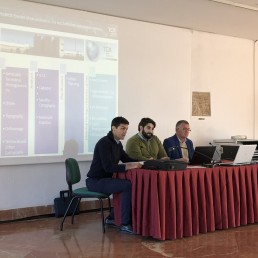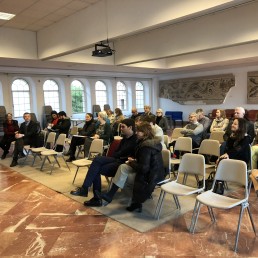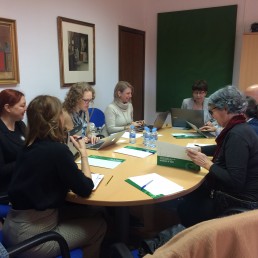Call for Short Term Scientific Missions 2018-2020
ARKWORK STSM-Call 2018-2020
Call 2017
We are funding STSMs over the period 2018-2020, with an average funding/STSM of approximately €1500 (a maximum €2500 in total can be afforded to the grantee).
Please note that the financial support available via this scheme is a contribution towards the travel and subsistence cost of a STSM and may not necessarily cover all the costs. Applicants are encouraged to submit proposals with a high benefit/cost ratio.
Criteria for Funding
- The Applicant should be engaged in a research program as a post-graduate student, postdoctoral fellow or be employed in an institution in a ARKWORK member country; ARKWORK member countries can be found at: http://www.cost.eu/COST_Actions/ca/CA15201?parties
- Applicants are responsible for obtaining the agreement of the host institution BEFORE the submission of their application;
- The research subject of the STSM must be relevant for ARKWORK and the STSM must contribute to their aims of the network as described in its Memorandum of Understanding (MoU). The MoU can be found at: http://www.cost.eu/COST_Actions/ca/CA15201?
- The Applicant and its host must be from two different ARKWORK member countries;
- STSM funding is a contribution towards travel and subsistence costs, and cannot be used as a salary;
- Duration of a standard STSM: a minimum of 5 working days and a maximum of 90 days, for ECIs the maximum length is 180 days.
- All STSMs need to be carried out within their entirety within a single grant period and within the Action’s lifetime;
- Geographical and gender balance issues will be taken into consideration;
- Applications from ECIs will be privileged.
Download the Call and the Guidelines here:
CFP: User Experience Design in Archaeology and Heritage
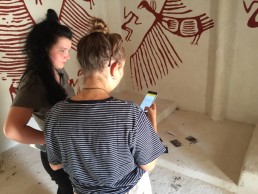
CAA International Conference in Kraków, Poland, 23-27 April, 2019
· Are you designing digital resources for different archaeological users – specialists and wider audiences alike?
· Do you deploy – or do you want to deploy – methods from the UX (user experience) and participatory design fields?
· What workflows do you follow in iteratively developing your digital outputs? How are end users and stakeholders involved throughout these workflows?
· What evaluation methodologies are you using to assess the successes and failures of your digital work with diverse audiences?Please join us to explore these questions (and more!) in our Roundtable Session #S36 on User Experience Design in Archaeology & Cultural Heritage at the CAA International Conference in Kraków, Poland, 23-27 April, 2019.We welcome all contributors who are working to integrate archaeological/heritage data and digital platforms into experiences that are truly tailored to the needs and expectations of their users.We seek to discuss your iterative methodologies, your users’ experiences, and your lessons-learned in order to refine user experience design models & toolkits for the archaeology and heritage sector.
The full abstract for our session is pasted below. This is a discussion-focused session and papers should be ‘flash’ in nature – i.e., no more than 10 minutes – and will be pre-circulated to allow us to delve into specifics during moderated discussion periods.
Deadline for submission of abstracts is Wednesday 10 October 2018.
To apply: Submit an abstract of no more than 250 words, excluding session title, author names, affiliations, and email addresses as well as 3 – 5 keywords. Please go to the CAA conference website (https://ocs.
This roundtable is part of the EU COST ACTION network ARKWORK: https://www.arkwork.
We hope you can join us!
User Experience Design in Archaeology and Cultural Heritage (CAA conference, Session 36)
Francesca Dolcetti (University of York)
Rachel Opitz (University of Glasgow)
Sara Perry (University of York)
Despite the widespread dissemination of digital tools and applications in both archaeology and heritage, relatively little is known about their real effectiveness and impact on diverse audiences (specialists and lay publics alike). A new iterative design workflow, involving end users and stakeholders from the outset, as well as an accompanying design evaluation methodology, may open new avenues for engagement while, at once, constructively influencing our research objectives and epistemologies.
In this Roundtable session, we seek to bring together a multidisciplinary group looking at different aspects of archaeological knowledge production to discuss theoretical and methodological issues in the field of participatory design and user experience, and to foster a critical understanding of how this knowledge is used and its social impact. Our aim is to convene researchers and practitioners in a dialogue that is focused on examples of interdisciplinary co-creation and user testing of Augmented, Virtual and Mixed Realities (AR, VR, and MR) and related digitally-mediated experiences for museums, archaeological and cultural heritage sites, and varied teaching and research contexts. We are particularly interested in practical experiences around how to integrate archaeological data, storytelling and digital platforms to create experiences truly tailored to the needs and expectations of users.
The format of this Roundtable is a series of flash position papers (10 minutes maximum) followed by periods of moderated discussion. The session concludes with an open floor discussion and a wrap-up report summarising the discussion and suggesting follow-up activities. Position papers will be submitted in advance to the session chairs and shared with all panelists. The session welcomes participants from different sectors including but not limited to digital humanities, archaeology, museology, design research and Human-Computer Interaction (HCI).
Training School 2018 – Announcement
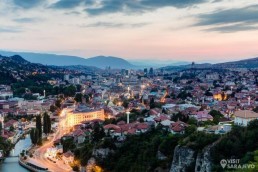
ARKWORK action working group 2 is holding a 5-day training school on the topic of archaeological collections in a digital environment in Sarajevo from 17-21 September 2018. The school is hosted by International Burch University https://www.ibu.edu.ba/en/about/about-burch.html) located at Ilidza, suburb of Sarajevo, capital of Bosnia and Herzegovina (http://www.sarajevo-tourism.com/).
During the training school led by international experts, participants from 17 different countries study processes of creating, organising, managing and exploring archaeological collections in a digital environment, and learn how to examine, evaluate and use different state-of-the art methods and tools to work with archaeological collections. They examine how archaeologists create digital objects and documents in different contexts, how they integrate these diverse and scattered knowledge sources, and how these insights can be used to inform the development of the state-of-the-art and practical management of the work with archaeological collections. They also get hands-on experience in using software tools for the analysis of digital archaeological collections. Finally, the participants examine how this archaeological knowledge work can be disseminated to different stakeholder groups.
Preliminary program
| Day | Date | Activity |
| Monday | 17.09.2018 | Introduction; Trainees’ research interests and topics |
| Tuesday | 18.09.2018 | Documentation practices in digital environment; Museum visit |
| Wednesday | 19.09.2018 | Archaeological knowledge organisation in dig. env.; Museum visit |
| Thursday | 20.09.2018 | Archaeological knowledge production from digital data; Museum visit |
| Friday | 21.09.2018 | Final discussions; Conclusion |
Saturday, 22.09.2018 – Optional excursion to Radimlja, Stolac https://whc.unesco.org/en/list/1504
COST Action COST-ARKWORK CA15201 Training School 2018 - Call for Trainees
Theme: Studying archaeological collections in the digital environment
Date & Location: Sarajevo, Bosnia and Herzegovina, 17-21 September 2018 (5 days)
Local Host: International Burch University, www.ibu.edu.ba
Venue: International Burch University, Francuske revolucije bb., 71210 Ilidza, Canton
Sarajevo, Bosnia and Herzegovina
About this Training School
The training school aims to get participants acquainted with the process of creating,
organising, managing and exploring archaeological collections in digital environment, and
learn how to examine, evaluate and use different state-of-the art methods and tools to work
with archaeological collections. During the training school, participants will examine how
archaeologists create digital objects and documents in different contexts, how they integrate
these diverse and scattered knowledge sources, and how these insights can be used to inform
the development of the state-of-the-art and practical management of the work with
archaeological collections. They will also get hands-on experience in using software tools for
the analysis of digital archaeological collections. Finally, the participants will examine how
this archaeological knowledge work can be disseminated to different stakeholder groups.
Download the Call here
The call for contributions to a special JCAA issue on Digital Scholarship in archaeology is now open!
Special Issue on Digital Scholarship in archaeology
The call for contributions to a special JCAA issue on Digital Scholarship in archaeology is now open!
The JCAA is a peer-reviewed, open access, electronic journal, featuring papers in all the disciplines related to digital archaeology, including 3D modelling, spatial analysis and remote sensing, geophysics, other field recording techniques, databases and semantic web, statistics and data mining, simulation modelling, network analysis and digital reconstructions of the past.
This prospective JCAA special issue aims to facilitate discussion on the theoretical and philosophical aspects of digital scholarship in archaeology as well as the implications of the use of digital technologies and computational methods across the extent of the archaeological knowledge chain: from discovery, through observation, explanation, and dissemination. How are research, synthesis, practice, and teaching within archaeology mediated and transformed by digital approaches?
Deadlines: June 15th (abstracts), December 31st (full papers)
More info here.
WG2 Workshop on Managing Small Archaeological collections
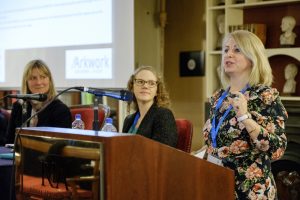
The workshop organised in Dublin gathered experts interested best practices for managing small collections of artefacts. Such artefacts may be part of a larger collection or may be too small to warrant professional tools and policies designed for larger collections, but still need care. This workshop provided attendees with information about how to gain intellectual control and provide access to these smaller collections of items, using best practices from archaeology.
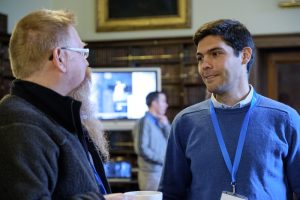
Experts from across the EU presented case studies to introduce topics related to physical and intellectual access, adopting good practices, and using digitsation wisely. Participants worked on exercises, drawing on the case studies to develop best practices for their own situation as well as contribute to a website listing best practices for small artifact collections, all with the assistance of EU experts.
Invited talk
Ms. Sarah Castigan, the Deputy Director of the Little Museum of Dublin, provided the keynote at the WG2 workshop on Managing Small Collections, held in Dublin in April, 2018. She spoke of working with different community groups in developing collections.
Workshop Programme
9am-9:30am registration/coffee
9:30-10:30am Introduction
10:30-11:30 Case study 1: Physical and intellectual access of archaeological objects
Marina Toumpouri (Aristotle Univ., Cyprus) will present a case study about Ecclesiastical objects.
11:30-12:00 Coffee break
For special dietary considerations, please contact Dr. Cushing at [email protected] once registered.
12:00-1:00 Case study 2: Good practices for small archaeological collections
Eszter Istvanov and (Lorand Univ, Hungary) Valeria Kulcsar (Univ. of Pecs, Hungary) will present a case study about school collections.
1:00-2:00 Lunch
Lunch will include a selection of sandwiches, salads and sides. For special dietary considerations, please contact Dr. Cushing at [email protected] once registered.
2:00-3:00 Case study 3: Digitisation of small archaeological collections
Meliha Handzic (Burch Univ, Bosnia and Herzegovina) will present a case about using digitisation to provide access to a municipal collection of Bosnian medieval tombstones.
3:00-3:45 Coffee break
For special dietary considerations, please contact Dr. Cushing at [email protected] once registered.
3:45-5pm Development of guidelines
Gisli Palsson (The Institute of Archaeology, Iceland) and Amber Cushing (Schol of Information & Communication Studies, UCD) will act as moderators and lead a session to help participants extract useful information from the case studies for their own situation, as well as some general guidelines/take aways for managing small collections of artefacts. Additional COST members from across Europe will be available to share their expertise and assist attendees.
About the speakers
Marina Toumpouri completed her undergraduate studies in Musicology and Art History at the Universities of Lorraine and Strasbourg. She received her Ph.D. in Art history in 2010 from the University of Lille 3-Charles de Gaulle. Her research and publications deal with hagiographic iconography, the production of Western and Greek illuminated manuscripts in the Eastern Mediterranean (12th-15th century), the materiality of manuscripts and the use of new tools and methodologies for identifying the methods of work of medieval artists and craftsmen. She is currently member of the Mount Athos manuscripts’ digitization project team (Athoniki Psifiaki Kivotos) and prior she was involved in the digitization project of the Greek papyri of the National University Library of Strasbourg. She was involved in different research projects in France, Cyprus, Greece and the U.K. and previously she held a curatorial position at the department of monuments and relics of the Church of Cyprus (The Holy Bishopric of Limassol). She was the recipient of a number of research grants.
Valéria Kulcsár holds an MA in archaeology and history and a PhD in the science of history from the Hungarian Academy of Sciences. She has worked as an archaeologist at the Petőfi Museum, Aszód (Directory of Pest County Museums), and Katona József Museum, Kecskemét (Directory of Bács-Kiskun County Museums). She is currently academic staff at University of Pécs (Pécs, Hungary). Her research interests include Roman Age Barbarians and the Early Migration Period.
Eszter Istvánovits holds a PhD in archaeology from the Hungarian Academy of Sciences. She has worked as the archaeological coordinator of excavations and other capital construction works in Hungary as well as a archaeologist-museologist at the Jósa András Museum, Nyíregyháza (Directory of Szabolcs-Szatmár-Bereg County Museums). Her area of interest is Barbarians of Roman Age (Sarmatians, Germans, Dacians), Hun Age, Early Migration Period.
Meliha Handzic is Professor of Management and Information Systems at the International Burch University, Sarajevo. Her PhD is from the University of New South Wales, Sydney. Meliha’s main research interest lies in the area of knowledge management (KM), with a particular focus on the processes and socio-technological enablers of knowledge creation, sharing, retention and discovery. She has published extensively on these topics in leading journals, international conference proceedings and books. Presently, Meliha is an active member of several professional societies and groups and serves on editorial boards, executive and program committees for numerous international journals and conferences. She is also a recipient of the KM Leadership Award in 2014.
Gísli Pálsson is a landscape archaeologist who primarily works in Iceland and Sweden, affiliated with The Institute of Archaeology, Iceland and Umea University. Gisli’s main concerns in archaeology are landscape survey, archaeoinformatics, network analysis and the role of creativity in archaeological practice. His fieldwork in recent years has concentrated on Viking Age ceremonial landscapes and movement systems, both in Iceland. Gísli is currently conducting research into the role of resource claims and property ownership on agricultural land use through the project Storied lines: tracing the tendrils of agency across the Icelandic landscape (http://jardabok.com).
Amber L. Cushing is a Lecturer/Assistant Professor at the School of Information and Communication Studies, University College Dublin in Ireland where she also serves as Director of the Msc in Digital Curaiton Programme and Director of the PhD in Information and Communication Studies Programme. She previously served as Director of the Allenstown, NH Public Library while managing her consulting business, Cushing Information Consulting. She has taught graduate courses in Digital Curation, Research Methods, Information Resources and Services, Archival Access and Technology Issues and Archival Outreach. Cushing holds a PhD in Information and Library Science from the University of North Carolina at Chapel Hill, an MLIS with a concentration in Archives Management from Simmons Graduate School of Library and Information Science, and a BA in History from Mount Holyoke College. Her main area of study concerns how individual perceptions of value in digital collections can influence institutional practices in LAMs.
Materials
- http://www.vhnireland.org/past-conferences/conference-2018-2/pre-conference-workshop-2018//
- Highlights from the workshop on video (until 0:24) at https://www.youtube.com/watch?v=hIT3ANiHPQ8
ARKWORK represented at the Digital Humanities in the Nordic Countries conference, Helsinki
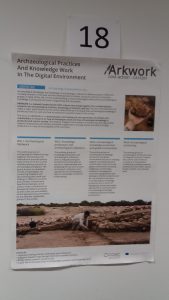
Last week saw the Digital Humanities in the Nordic Countries conference 2018 (DHN2018), hosted by the University of Helsinki, Finland. The event attracted delegates from the Nordic nations and beyond, including other parts of Europe and from further afield too. ARKWORK displayed our Network poster as part of the poster session held on Friday 9th March.
To see highlights and updates from the conference, search for the hashtag #DHN2018 on Twitter.
Workshop "What are archaeological practices" in Aveiro
On the 5. and 6. October we met in beautiful Aveiro to discuss what archaeological practices are and to meet in the working grops. The event was hosted by the University of Aveiro. Here you can find two of the insightful presentations that we heard in the workshop.
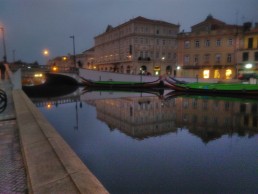
COST Action COST-ARKWORK CA15201 Training School 2017 - Call for Trainees
Theme: Studying Archaeological fieldwork, knowledge production, and the digital environment
Date & Location: Athens, Greece, 6.-10. Nov 2017 (5 days)
Local Host: Digital Curation Unit/Athena Research Centre, Hellenic Ministry of Culture and Sports, Association of Greek Archaeologists
Venue: Association of Greek Archaeologists
About this Training School
The training school aims to get participants acquainted with the goals, theories, concepts and methods of the study of archaeological practices, by examining state-of-the-art digital field methods and how these have changed archaeological knowledge production in science and heritage management. During the training school we will explore how archaeologists are conducting fieldwork and how they document their work and findings in different countries and contexts. We will further examine how this analysis of archaeological knowledge work can contribute to developing fieldwork practices and the use and usability of archaeological findings by different stakeholder groups.
Download the Call here:
Share
